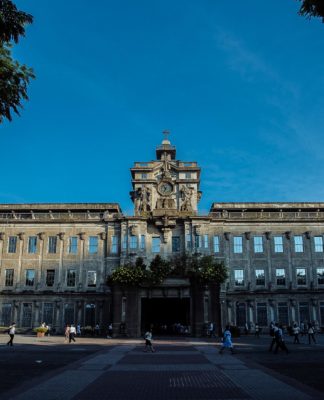A NEWS media reporter approached me for an interview on the fifth day of the International Eucharistic Congress (IEC) after the talk of Cardinal Luis Antonio Tagle on the subject “The Eucharistic and the Dialogue with Cultures.” I was stunned by her first question, “What had the Church done, referring to the bishops and clergy, to alleviate poverty and degradation of moral values?” Noticing my silence and feeling of inadequacy to answer her question, she simply asked me to write an article instead. Despite my limited perception on the subject, I find the topic appropriate to share.
The theme of the 51st IEC “Christ in You… Our Hope of Glory” sends us a message, that life has always a meaning and that it is always beautiful and hopeful no matter hard it appears. There is always something good in it and we should always be thankful.
I was only two-years old when the first IEC was held in the country on Feb. 7, 1937 in Luneta, Manila and certainly most of the delegates who attended the second IEC last Jan. 24 to 31 in Cebu have not been born yet.
The eight-decade gap however did not dampen the spirit of Filipinos but instead, we enthusiastically accepted to host this momentous religious undertaking in our country. They held up their faith and bonded with delegates from 71 countries in raising up Jesus for all of Asia and the entire world.
My joining this 51st IEC was a calling from God through the works of Mary and the Holy Spirit for me and my wife Ling to renew our baptismal vows, to find stronger union with God and experience solidarity with all the 15,000 delegates and 1.2 million participants from 71 countries.
This 51st IEC is a spring of graces starting with the beautiful testimonies, talks and faith sharing from prominent foreign and local Church leaders, the encounters in 14 various churches in Cebu, the “Visita Iglesia,” the 5,000 children who received their first communion officiated by Cebu Archbishop Emeritus Ricardo Cardinal Vidal, the overnight vigil at Plaza Independencia, the banquet called the “Table of Hope” for 1,000 children from urban families, the touching stories of a young boy born without a right leg and a rich business woman from Bangkok, Thailand who spent fourteen years of her life as a fugitive accused of serious crimes she did not commit, the “Sinulog” presentation, and the culminating mass, “Statio Orbis.”
The eight-day event, for me, is an unprecedented memory to remember. It clearly answers what our faith is all about and bears an authentic evidence of the unifying power of the Eucharist.
Christian leaders
I find it not only timely but also relevant to share some thoughts and experiences I have acquired and echo them to all the faithful in relation to its significance to the forthcoming national elections.
The first thought that came to my mind is, what quality of leaders does our nation deserve? Starting Feb. 8 to May 7, 2016 candidates for national and local positions will start their campaign. What do our citizens expect or look for in our future leaders? The message of hope in the just concluded IEC brings us a resounding challenge to our future leaders.
Filipinos are known to be friendly, hospitable, industrious and prayerful. Pope Francis once said, “The Philippines has a special mission given to them by God as a gift… to bring Christ in Asia and Christ to the world.”
Pope Benedict XVI has high praise, trust and faith among us Filipinos when he announced during the last day of the 50th IEC last June 17, 2012 in Dublin, Ireland that the 51st IEC would be held in Cebu, Philippines.
Our future leaders should be the mouthpiece of Jesus in their campaign promises, strategies and platforms, to make themselves true partners journeying together for the care of our nation and be stewards of God’s creation and everything that dwells in it. Behave and act as responsible Christian leaders rather than “masters.” Lend your ears and patience to the needs of the poor, homeless, disabled and jobless. Sins of greed and pride are the prime evil of other culture of sins prevailing among most of our government officials. Politics is about issues and values.
All candidates should focus their campaign to issues with significant moral dimension. They should not remain silent and complacent to the prevailing issues of culture of graft and corruption, degradation of moral values, injustices, abuse of power, selfishness, idolatry and all acts and thinking of “man-made gods” of money, earthly material possessions, pleasures and power.
Campaign messages and promises should be a call to political responsibility. The voice of truth should be read and heard in all campaign efforts, talks, billboards, TV ads, newsletter, social media and interviews instead of simply talking and being entertained by celebrities. Responsible stewardship is the key to building a strong nation.
Finally, in designing their roadmap of good governance, candidates should properly use God-given gifts of talents, wisdom, time and resources. They must think, believe and work like a good shepherd “who seeks not be judge but to love.”
More so, they should go beyond their personal or family needs and look into the needs of others especially the poor, handicap, the hungry victims of calamities and the very unfortunates in our society and the care of our environment.
Start with the family
It is sad to hear that Filipinos who are considered the most prominent Catholics in Asia, their attendance at Sunday masses had significantly gone down to 37 percent from 60 percent in the 1990s. Asia has the smallest percentage of Christians and only 6 percent know who Christ is.
With this, I invite all Christians to live, renew and model their lives as a “celebration of the mystery of life and love of Jesus Christ” by offering their lives in sacrifice for the poor, homeless, disabled and victims of injustice.
None equals the power of prayers especially during Sunday masses. Let us remember that what human capacity, plans and acts cannot achieve, the sacrifice of the Holy Eucharist during Sunday masses could supply and complete.
God is challenging us “to do the little you can with the right spirit and God will do the rest”. Cardinal Timothy Dolan, archbishop of New York, explained the vital role of Mary in the Eucharist saying, “if you want to be close to Jesus on the Cross at the Holy Sacrifice of the mass, be closer to Mary. She’s right next to Jesus.”
Dr. Ricardo S.D. Ledesma belongs to the Class of 1960 of the Faculty of Medicine and Surgery, who specialized in family medicine. A church and community worker for four decades, he is a papal awardee, having received the Pro Ecclesia Pontifice from the Holy See.


















